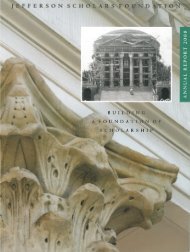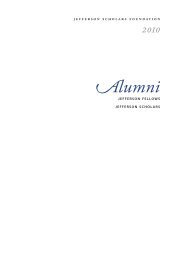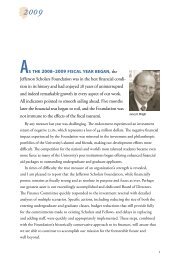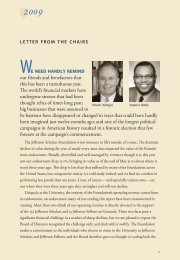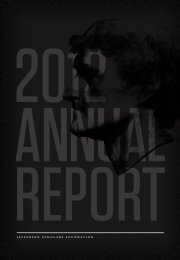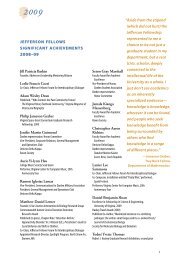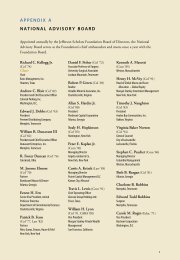2010 - Jefferson Scholars Foundation
2010 - Jefferson Scholars Foundation
2010 - Jefferson Scholars Foundation
You also want an ePaper? Increase the reach of your titles
YUMPU automatically turns print PDFs into web optimized ePapers that Google loves.
jefferson scholars foundation <strong>2010</strong><br />
emerges as an inherently playful<br />
activity. Accepting this proposition<br />
offers the opportunity to<br />
examine musical creation from a<br />
new perspective. The later part of<br />
the previous century witnessed<br />
the development of a rich body of<br />
literature on human play. Thinkers<br />
like Johan Huizinga, Roger Caillois,<br />
Gregory Bateson, and Brian<br />
Sutton-Smith (to name only a<br />
few) posited intricate theories<br />
about the mechanisms and meanings<br />
of play. Examining how these<br />
theories are reflected in the act of<br />
composition presents new methods<br />
for composers, analysts, and<br />
listeners to understand musical<br />
creation and relate to its results.<br />
stacie l.<br />
thyrion<br />
The pedagogical Value of<br />
plato’s phaedrus<br />
Plato’s Phaedrus is a curiously selfcritical<br />
work. In this middle-period<br />
dialogue of Plato, Socrates suggests<br />
that all compositions should<br />
be put together like a living<br />
creature, with a head, middle, and<br />
extremities all fitting each other<br />
and the whole. In spite of this the<br />
Phaedrus appears to have two<br />
disjointed halves: the first a series<br />
of three speeches about love, and<br />
the second a dialectic exchange<br />
about the art of good rhetoric. In<br />
the final pages of the dialogue<br />
Socrates also famously criticizes<br />
Stacie Thyrion, the <strong>Jefferson</strong> <strong>Scholars</strong> <strong>Foundation</strong> Fellow (Philosophy), discusses Plato’s Phaedrus.<br />
writing, for causing forgetfulness<br />
in the writer, for creating a false<br />
appearance of wisdom in the<br />
reader, and for being unable to<br />
respond to questions or criticisms.<br />
He presents in contrast a truer<br />
form of writing: writing directly<br />
on the soul of a student through<br />
philosophic dialogue. Readers<br />
have wondered since antiquity<br />
whether Plato meant to undermine<br />
seriously his written works<br />
with these self-criticisms. In this<br />
talk I use the standards of good<br />
composition presented within the<br />
work to assess the value of the<br />
Phaedrus itself. How does Plato’s<br />
written philosophy measure up<br />
to these standards? Did Plato<br />
believe his written philosophy<br />
could, like the dialectic method<br />
of his teacher Socrates, lead a<br />
reader to acquire knowledge? We<br />
might even attack a more difficult<br />
question: Did Plato intend for his<br />
dialogues to be published outside<br />
the Academy?<br />
11




